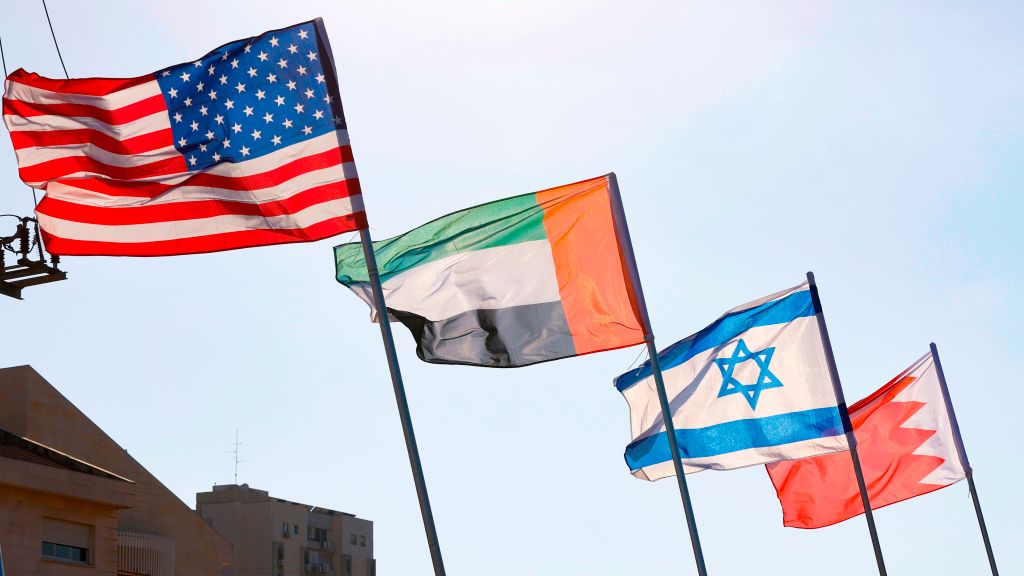Israel, Arab nations want a say in Biden's Iran negotiations. Here's why his advisers are skeptical.


A free daily email with the biggest news stories of the day – and the best features from TheWeek.com
You are now subscribed
Your newsletter sign-up was successful
Representatives from Israel and several Gulf Arab nations want their countries to have a seat at the table when the Biden administration begins negotiating with Iran next year, Politico reports.
Ambassadors to the United States from Israel, the United Arab Emirates, and Bahrain — the countries involved in the Abraham Accords — told Politico they have more at stake than the U.S. and European countries who crafted the original Iran nuclear deal in 2015, and they think the U.S. is in a stronger position now than during the Obama administration. The U.S. would sacrifice leverage by rehashing the old agreement, Israeli Ambassador to the U.S. Ron Dermer said. If regional partners were included in the negotiations, they believe they could help secure a brand new agreement that not only makes it more challenging for Iran to build a nuclear weapon, but also one that targets its ballistic missiles program and use of proxy militias.
Robert Satloff, the executive director of the Washington Institute for Near East Policy, agrees Biden should not "freeze" the parties out of talks. "After all, what the Biden administration should want is not just an agreement that the Iranians accept, but one that will last," he told Politico.
The Week
Escape your echo chamber. Get the facts behind the news, plus analysis from multiple perspectives.

Sign up for The Week's Free Newsletters
From our morning news briefing to a weekly Good News Newsletter, get the best of The Week delivered directly to your inbox.
From our morning news briefing to a weekly Good News Newsletter, get the best of The Week delivered directly to your inbox.
Still, Politico notes, people in Biden's orbit remember Israeli Prime Minister Benjamin Netanyahu working hard to "scuttle the 2015 nuclear agreement, making moves many of them deemed downright insulting" to former President Barack Obama. Therefore, they fear Israel and the Arab states may "act as spoilers" in future talks."Renegotiating everything is just unrealistic to anybody who talks to an Iranian," the official said. "The idea that we have leverage to just start over is nice in theory, but in practice there's no way the Iranians will go for it," one former U.S. official said. "If Biden comes in and that's the stand, the Iranians will be convinced that there's no serious engaging with the U.S." Read more at Politico.
A free daily email with the biggest news stories of the day – and the best features from TheWeek.com
Tim is a staff writer at The Week and has contributed to Bedford and Bowery and The New York Transatlantic. He is a graduate of Occidental College and NYU's journalism school. Tim enjoys writing about baseball, Europe, and extinct megafauna. He lives in New York City.
-
 Tourangelle-style pork with prunes recipe
Tourangelle-style pork with prunes recipeThe Week Recommends This traditional, rustic dish is a French classic
-
 The Epstein files: glimpses of a deeply disturbing world
The Epstein files: glimpses of a deeply disturbing worldIn the Spotlight Trove of released documents paint a picture of depravity and privilege in which men hold the cards, and women are powerless or peripheral
-
 Jeff Bezos: cutting the legs off The Washington Post
Jeff Bezos: cutting the legs off The Washington PostIn the Spotlight A stalwart of American journalism is a shadow of itself after swingeing cuts by its billionaire owner
-
 Judge blocks Hegseth from punishing Kelly over video
Judge blocks Hegseth from punishing Kelly over videoSpeed Read Defense Secretary Pete Hegseth pushed for the senator to be demoted over a video in which he reminds military officials they should refuse illegal orders
-
 Trump’s EPA kills legal basis for federal climate policy
Trump’s EPA kills legal basis for federal climate policySpeed Read The government’s authority to regulate several planet-warming pollutants has been repealed
-
 House votes to end Trump’s Canada tariffs
House votes to end Trump’s Canada tariffsSpeed Read Six Republicans joined with Democrats to repeal the president’s tariffs
-
 Bondi, Democrats clash over Epstein in hearing
Bondi, Democrats clash over Epstein in hearingSpeed Read Attorney General Pam Bondi ignored survivors of convicted sex offender Jeffrey Epstein and demanded that Democrats apologize to Trump
-
 El Paso airspace closure tied to FAA-Pentagon standoff
El Paso airspace closure tied to FAA-Pentagon standoffSpeed Read The closure in the Texas border city stemmed from disagreements between the Federal Aviation Administration and Pentagon officials over drone-related tests
-
 Judge blocks Trump suit for Michigan voter rolls
Judge blocks Trump suit for Michigan voter rollsSpeed Read A Trump-appointed federal judge rejected the administration’s demand for voters’ personal data
-
 US to send 200 troops to Nigeria to train army
US to send 200 troops to Nigeria to train armySpeed Read Trump has accused the West African government of failing to protect Christians from terrorist attacks
-
 Grand jury rejects charging 6 Democrats for ‘orders’ video
Grand jury rejects charging 6 Democrats for ‘orders’ videoSpeed Read The jury refused to indict Democratic lawmakers for a video in which they urged military members to resist illegal orders
